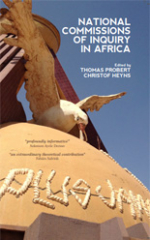National Commissions of Inquiry in Africa: Vehicles to pursue accountability for violations of the right to life?

National Commissions of Inquiry in Africa: Vehicles to pursue accountability for violations of the right to life?
Edited by Thomas Probert and Christof Heyns
2020
ISBN: 978-1-920538-86-6
Pages: 338
Print version: Available
Electronic version: Free PDF available
| File Size: | 2.71 MB |
| File Type: | application/pdf |
| Hits: | 7622 Hits |